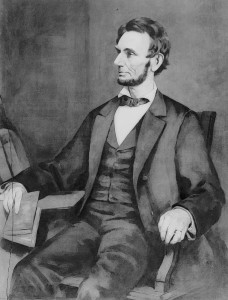![Sergeant A.M. Chandler of the 44th Mississippi Infantry Regiment, Co. F., and Silas Chandler, family slave, with Bowie knives, revolvers, pepper-box, shotgun, and canteen ( [United States], [between 1861 and 1863]; LOC: http://www.loc.gov/pictures/item/2014647512/)](https://www.bluegrayreview.com/wp-content/uploads/2015/03/00834r-300x254.jpg)
“Sergeant A.M. Chandler of the 44th Mississippi Infantry Regiment, Co. F., and Silas Chandler, family slave, with Bowie knives, revolvers, pepper-box, shotgun, and canteen” between 1861 and 1863 (Library of Congress)
From The Papers And Writings Of Abraham Lincoln, Volume Seven:
ADDRESS TO AN INDIANA REGIMENT,
MARCH 17, 1865.
FELLOW-CITIZENS:—It will be but a very few words that I shall undertake to say. I was born in Kentucky, raised in Indiana, and lived in Illinois; and now I am here, where it is my business to care equally for the good people of all the States. I am glad to see an Indiana regiment on this day able to present the captured flag to the Governor of Indiana. I am not disposed, in saying this, to make a distinction between the States, for all have done equally well.
![Fredericksburg, Virginia. Wounded Indians from the Wilderness on Marye's Heights (1864 May [19 or 20]; LOC: LC-DIG-cwpb-01550)](https://www.bluegrayreview.com/wp-content/uploads/2015/03/01550r-275x300.jpg)
“Fredericksburg, Virginia. Wounded Indians from the Wilderness on Marye’s Height ” 1864 May [19 or 20]. (Library of Congress)
PROCLAMATION CONCERNING INDIANS,
MARCH 17, 1865.
BY THE PRESIDENT OF THE UNITED STATES OF AMERICA:
A Proclamation.
Whereas reliable information has been received that hostile Indians, within the limits of the United States, have been furnished with arms and munitions of war by persons dwelling in conterminous foreign territory, and are thereby enabled to prosecute their savage warfare upon the exposed and sparse settlements of the frontier;
Now, therefore, be it known that I, Abraham Lincoln, President of the United States of America, do hereby proclaim and direct that all persons detected in that nefarious traffic shall be arrested and tried by court-martial at the nearest military post, and if convicted, shall receive the punishment due to their deserts.
In witness whereof, I have hereunto set my hand, and caused the seal of the United States to be affixed……………….
A. LINCOLN.
By the President: WILLIAM H. SEWARD, Secretary of State.
A couple days earlier Mr. Lincoln had some kind words to say about his second Inaugural Address:
LETTER TO THURLOW WEED,
MARCH 15, 1865.
EXECUTIVE MANSION, WASHINGTON, D. C.
DEAR Mr. WEED:
Every one likes a compliment. Thank you for yours on my little notification speech and on the recent inaugural address. I expect the latter to wear as well as perhaps better than—anything I have produced; but I believe it is not immediately popular. Men are not flattered by being shown that there has been a difference of purpose between the Almighty and them. To deny it, however, in this case, is to deny that there is a God governing the world. It is a truth which I thought needed to be told, and, as whatever of humiliation there is in it falls most directly on myself, I thought others might afford for me to tell it.
Truly yours,
A. LINCOLN.
Civil War Daily Gazette has pointed out that President Lincoln spoke his message to the Indiana regiment before he heard that the Confederate government had enacted a law to use slaves as soldiers.
You can read much more about A.M. Chandler and his family slave at the Library of Congress with some interesting links. Although armed in the photo, I have not seen any evidence that Silas actually fought the Yankees. A.M. was severely wounded at Chickamauga; Silas returned to the field to serve Benjamin Chandler in 1864.

